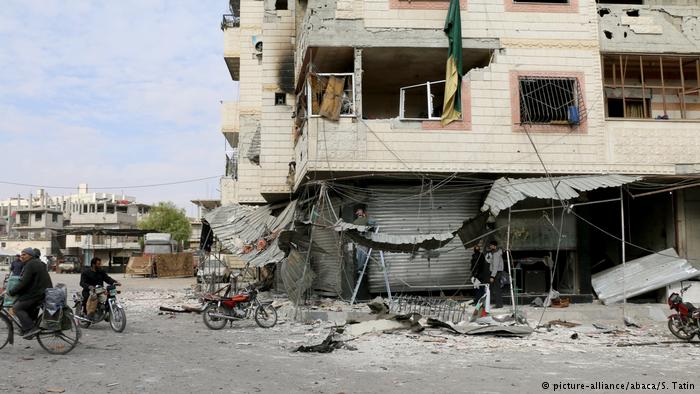
In the run-up to United Nations peace talks at the end of November, Russian-backed Syrian government forces launched attacks across the country at the weekend, killing dozens of civilians in the process, according to independent monitors.
Airstrikes and artillery fire on the rebel-held Eastern Ghouta region outside the Syrian capital killed at least 23 people on Sunday, including four children, the UK-based Syrian Observatory for Human Rights (SOHR) said.
The locally-run Ghouta Media Center confirmed the death toll and posted a video of rescuers arriving in the affected area, picking up the dead and wounded from streets in a residential area.
In the “Islamic State”-held village of al-Shafah in the Deir el-Zour province, 53 civilians were killed, including 21 children, when Russian airstrikes hit “residential buildings,” SOHR told AFP news agency.
SOHR relies on a network of on-the-ground sources to relay information. The observatory said it determines aircraft used in air raids by location, flight patterns and munitions used.
Key points about Syria’s conflict
- The conflict erupted in 2011, when government forces launched a brutal crackdown against peaceful protesters calling for the release of political prisoners and for President Bashar al-Assad to step down.
- More than 300,000 people have been killed since then, with the civil war fracturing into a multi-front conflict involving global super powers, regional rivals and non-state actors.
- Multiple attempts to end the conflict have failed. However, the UN has sponsored new peace talks aimed at gathering support for a political solution scheduled to start on November 28.
Looming humanitarian crisis
Rebels in Eastern Ghouta have held out against Syrian government forces throughout the country’s nearly seven-year war. However, the government’s siege has caused a humanitarian crisis in the area, causing severe medical and food shortages.
Food supplies are so low in Eastern Ghouta that residents are eating trash and forcing their children to eat on alternate days, the UN World Food Programme said in a report published this week.
The opposition local council, called the Eastern Ghouta Damascus Countryside, said that the government’s escalating bombing was causing people to seek shelter in unsanitary places — which could lead to disease outbreaks.
Sunday’s deaths come despite Eastern Ghouta falling within a so-called “de-escalation zone” that was put in place by a deal brokered between Assad’s allies Russia and Iran as well as rebel-backer Turkey.
UN-backed peace talks are set to resume in Geneva on November 28 after several prior rounds of talks failed to agree on a way to stop the violence or to politically transition Syria.




